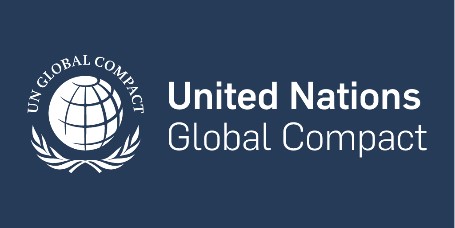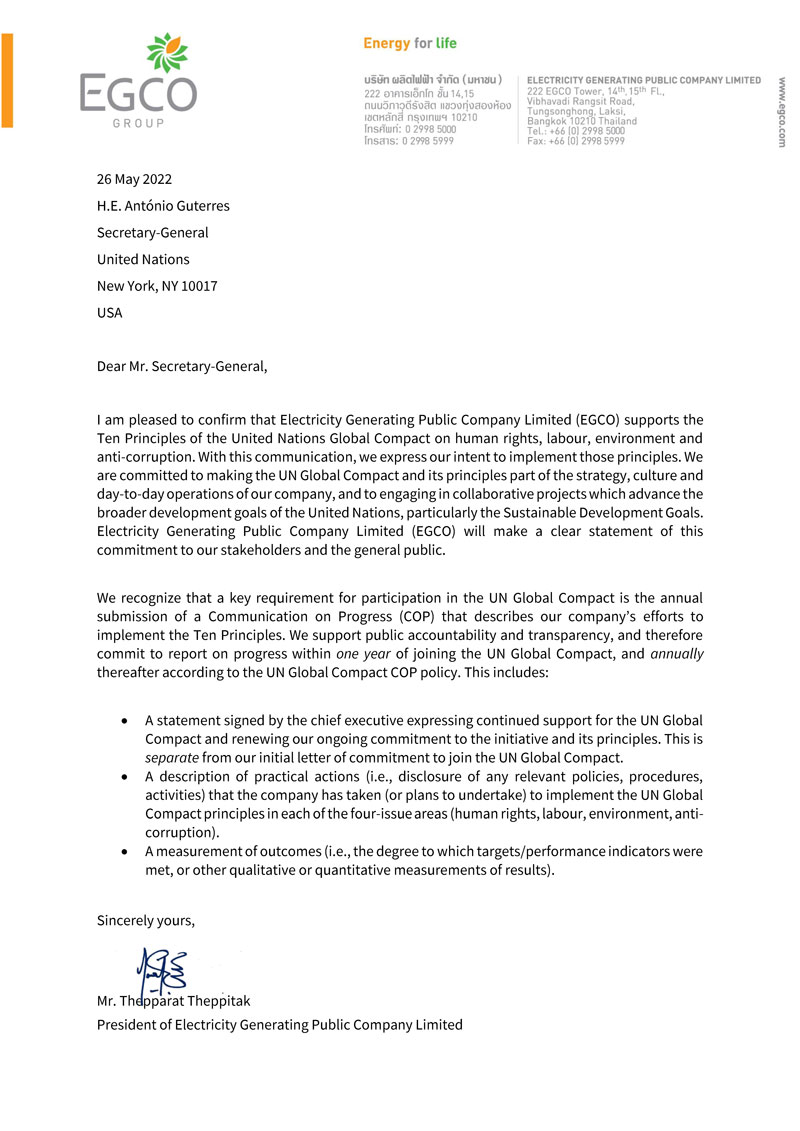Organization Contributions
[GRI 2-28 (2021)]
With a commitment to being a good member of society, EGCO Group supports various organizations and sectors to foster a partnership for coordination and collaboration in supporting and driving organizations that contribute to society and the country. Such efforts are aligned with the strategies or policies of EGCO Group and the organizations being supported, thereby promoting the growth and sustainability of both EGCO Group and its partners, while benefiting the overall society. To ensure that these supports comply with the laws, are transparent, auditable, and align with the company’s commitment that ‘any form of corruption is unacceptable, whether direct or indirect’, EGCO Group has established written guidelines for donations and support, as well as regulations for membership application to external organizations.
Topics supported by EGCO Group
Energy Sector and Sustainability Network
| Network | Details | EGCO Group Engagement and Value |
|---|---|---|
|
Electricity Supply Industry Association of Thailand (TESIA)  |
Electricity Supply Industry Association of Thailand (TESIA) was founded to foster the advancement and unity of the electricity sector. The main goals include promoting the exchange of technological knowledge and engineering expertise, building strong relationships and unity among its members, safeguarding their interests and professional security in electricity production and distribution, undertaking activities that benefit the public, and developing professional engineers for public benefit. |
|
|
Petroleum Institute of Thailand (PTIT)  |
Petroleum Institute of Thailand (PTIT) aims to advance the sustainable development of Thailand's petroleum, petrochemical, energy, and related industries by providing information services, fostering communication among stakeholders (government, industry, academia), supporting research and development, encouraging sound policies, promoting social responsibility, and facilitating human resource development within the sector |
|
|
Association of Private Power Producers (APPP)  |
Association of Private Power Producers (APPP) is an organization in the power industry that represent a group of good governance private power producers who have expertise and knowledge in power and energy business and share the same vision of driving for adequacy of energy supply, efficient use of energy and sustainable economy and social development as well as being the representative of private power producer to give the knowledge, experiences, sharing the view, express the idea and give suggestion on energy. |
|
|
Power Producer Industry Club  |
Power Producer Industry Club is a part of the Federation of Thai Industries (FTI). The club aims to strengthen the domestic power producer industry and facilitate cooperation in research, technology development, and product quality to meet user needs. It also supports projects that improve quality of life, society, and the environment, and backs policies for the sustainable development of organizations and Thailand. |
|
|
International Council on Large Electric System (CIGRE)  |
The International Council on Large Electric Systems (CIGRE) is a global association fostering collaboration and knowledge sharing in all areas of electric power systems. It unites professionals from over 90 countries through working groups, international events, and publications to advance the sustainable provision of electricity. CIGRE is a leading source of technical expertise in the power industry. |
|
|
Thai Chamber of Commerce  |
Thai Chamber of Commerce has objectives to facilitate business and trade as well as to serve as the central coordinating agency between the Government and the Private Sector. It aims to promote Thailand’s business and trade and to safeguard Thailand’s commercial interests on an equal term and as an equal partner with other countries. This will be a good channel to receive and exchange best practices on business and economic terms. |
|
|
Federation of Thai Industries (FTI)  |
The Federation of Thai Industries (FTI) aims to boost Thailand's industrial competitiveness and sustainability. It works to represent manufacturers, drive industrial progress, advise the government, support members, encourage collaboration, and promote sustainable growth through innovation and global engagement. |
|
|
Thailand Business Council for Sustainability Development (TBCSD)  |
TBCSD is an association focusing on driving sustainable development with business solutions from the business sectors. It provides platforms for companies to share knowledge and advocate business position while working with governments and other parties. |
|
|
Thai Listed Companies Association  |
Thai Listed Companies Association (TLCA), established in 1987, is a non-profit organization for companies listed on the Stock Exchange of Thailand (SET) and Market for Alternative Investment (MAI). It facilitates discussions on regulations, corporate governance, and ESG, provides networking opportunities through various clubs, organizes executive education, and collaborates with regulatory bodies within the Thai capital market. |
|
|
Thailand Environment Institute (TEI)  |
Thailand Environment Institutes (TEI) was established in 1993. Institute’s intention is to collaborate closely with its partners such as private sectors, government agencies, local communities, civil society partners, academia and international organizations for natural resources conservation and the balance in the environment which is the grass root for global and national sustainability. Its core roles involve advising on national environmental policy, developing environmental knowledge and standards, enhancing sustainable resource management capabilities, fostering environmental partnerships and networks, disseminating environmental information to the public, and promoting good governance within its operations. |
|
|
Global Compact Network Thailand (GCNT)  |
Global Compact Network Thailand (GCNT) is the local network of the United Nations Global Compact, established. GCNT supports Thai businesses in aligning their operations with the UN Global Compact's Ten Principles in human rights, labor, environment, and anti-corruption, and in contributing to the Sustainable Development Goals (SDGs). GCNT facilitates knowledge sharing, promotes responsible business practices, and encourages collaboration among companies, the UN, government, NGOs, and academia in Thailand to drive sustainable development |
|
|
Thailand Carbon Neutral Network (TCNN)  |
Thailand Carbon Neutral Network (TCNN) is a collaborative initiative established by the Thailand Greenhouse Gas Management Organization (TGO). It brings together private sector, government agencies, and local communities to promote the reduction of greenhouse gas emissions and drive sustainable growth towards a climate-friendly society, ultimately aiming for net-zero emissions in line with national and international goals. |
|
|
Thailand Bio-Diversity Network (B-DNA) Alliance  |
Thailand Bio-Diversity Network Alliance (B-DNA) is established through a collaboration between the International Union for Conservation of Nature (IUCN) and private companies. Primary objective is to enhance the private sector's role in conserving Thailand's biodiversity and contributing to the Sustainable Development Goals (SDGs) and Aichi Biodiversity Targets. B-DNA serves as a space for companies to increase their awareness and capacity for sustainability, network, and collaborate on conservation projects across the nation. |
|
|
Science Based Targets Initiatives (SBTi)  |
Science Based Targets initiative (SBTi) is a global body enabling businesses and financial institutions to set ambitious emissions reduction targets in line with the latest climate science. It defines and promotes best practices in science-based target setting, offering standards, tools, and guidance to help organizations align with the Paris Agreement goals of limiting global warming. SBTi independently assesses and validates targets, providing a clear pathway for companies to decarbonize and contribute to a net-zero economy |
|
Global Sustainability Network

EGCO Group became a member of the UN Global Compact in 2022, aiming to support UNGC’s 10 principles covering human rights, labor standards, environment, and anti-corruption issues. The company submitted an annual progress report (Communication on Progress: CoP) consistent with its Sustainability Report, to the UNGC to demonstrate its commitment and performance, in alignment with the 10 principles and SDG Goals.
Letter of Commitment to support the UNGC’s 10 Principles and the SDG Goals

